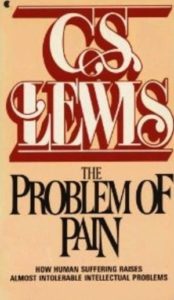There are some days that I’m nearly overwhelmed by the sinfulness of man. The more one appreciates the holiness of God and the absolute “rightness” of His laws, the more our deviations from His ways appear ludicrous and—well—downright stupid.
 C. S. Lewis dissected this abominable foolishness of sin in chapter five of his The Problem of Pain.
C. S. Lewis dissected this abominable foolishness of sin in chapter five of his The Problem of Pain.
From the first moment a creature becomes aware of God as God and of itself as self, the terrible alternative of choosing God or self for the centre is opened to it.
This sin is committed daily by young children and ignorant peasants as well as by sophisticated persons, by solitaries no less than by those who live in society: it is the fall in every individual life, and in each day of each individual life, the basic sin behind all particular sins.
We are quite adept at noticing those particular sins, whether sexual immorality, greed, or whatever. Yet those particulars flow from a way of looking at life that wants to dethrone the Rightful Monarch. The struggle never goes away entirely, even for those who say they have submitted their lives to God:
We try, when we wake, to lay the new day at God’s feet; before we have finished shaving, it becomes our day and God’s share in it is felt as a tribute which we must pay out of “our own” pocket, a deduction from the time which ought, we feel, to be “our own.”
What a delusion. Any time we have is a gift from the hand of God. Offering it back to Him should be a natural response. If we have truly been converted, if our thinking has been rearranged, we shouldn’t fall into this delusion so easily. But the temptation is always there.
They [human beings] wanted, as we say, to “call their souls their own.” But that means to live a lie, for our souls are not, in fact, our own. They wanted some corner in the universe of which they could say to God, “This is our business, not yours.” But there is no such corner.
Neither should we desire to find such a corner, but the pull to idolatry of oneself is strong, and we have to battle against it daily. That battle can be won, but only if we recognize it as a battle and actively participate in the war against self.
It [the human spirit] had turned from God and become its own idol, so that though it could still turn back to God, it could do so only by painful effort, and its inclination was self-ward.
Hence pride and ambition, the desire to be lovely in its own eyes and to depress and humiliate all rivals, envy, and restless search for more, and still more, security, were now the attitudes that came easiest to it.
 Lewis then pens a line that penetrates the soul, if understood correctly: “A new species, never made by God, had sinned itself into existence.”
Lewis then pens a line that penetrates the soul, if understood correctly: “A new species, never made by God, had sinned itself into existence.”
Sin was not God’s creation. We came up with that ourselves. Whenever we sin, we are destroying the perfection of what God has created; we are doing what He never intended for His universe.
In A Preface to Paradise Lost, Lewis offers this summary:
The Fall is simply and solely Disobedience—doing what you have been told not to do: and it results from Pride—from being too big for your boots, forgetting your place, thinking that you are God.
Today, let’s remember our place. Today, let’s set aside our pride. Today, let’s realize that our souls and our lives are not really our own. We owe everything to Him, and our lives need to show that. The world needs to see that.
